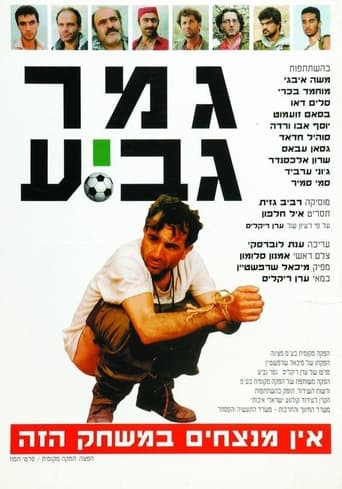eldino33
The Left Elbow Index considers film in terms of seven variables--acting, production sets, plot, character development, artistry, character development, and film continuity--on a scale from a high of 10 to a low of 1, with a 5 for an average film. Films like CUP FINAL draw all types of commentary related to the continual struggles in the Middle East, and agenda based evaluations are avoided by the Index. The first of the considerations of the index is acting, which in this film rates a 3, mostly because the level of acting seems to be somewhere between television mini-series quality and spaghetti western. This appears to result from the nature of the film and not on the ability of the cast. The production sets rate a 4 with too many outdoor scenes to merit much developmental opportunities. The plot merits a 2 based on the episodic nature of the film and a seeming lack of development. The characters appear mostly stereotypical, therefore a 3. One gets the feeling one has met them all before. The seems to be little artistry, except for some interesting camera angles--therefore, a 1. The dialogue is adequate, if sometimes a little quirky--a 5. It might be better if the characters said less, avoiding the seemingly forced dialogue in places. The film continuity seems puzzling. Is the film about the war, the World Cup, the soldiers, the terrorist, or all of the above. And why the wedding scene? It appears that the film wobbles too much from one idea to another--a 3 seems an appropriate ranking. The index average is 3.14, raised to a 5 when equated to the IMDb ratings,low but not hopeless. If one wants to see a movie of Middle East conflict and bathe in ideological elements of those many years of struggle, it is worth seeing.
bika
This opinion reveals minor details about the movie's plot.This 1991 Israeli offering is remarkable for the nuanced portrayal of a group of Palestinian fighters who take an Israeli soldier hostage during Israel's invasion of Lebanon in 1982. One of the drawbacks for a non-Israeli audience is a lack of familiarity with the political events that form the backdrop for the film.Lebanese society degenerated into a civil war in 1975, when the sizable Muslim minority began to receive outside support against the Christian majority. Israel sided with the Christian status-quo. In June 1982, in retaliation for attacks staged out of Lebanon by PLO forces, Israel invaded. The civil war lasted through 1990.
The nature of the Israeli army makes someone like Cup Final's protagonist, Cohen (played by Moshe Ivgi), a reality. Virtually all Israeli men serve in the "regular" army for three years, whereupon they either enter the "professional" army (by reenlisting for a longer term of service) or the reserve forces. The reserve force is massive, with Israeli men serving one month a year through their mid 40s or early 50s - sometimes even on the front lines, as is the case for Cohen in June 1982. About half of all women serve 20 month enlistments, though I am unsure whether they also enter the reserves at the end of their regular service.Cohen is shirt maker and a soccer fan, with tickets to the World Cup being played in Spain. His character therefore is not a contrived soldier/soccer fan, but an every day guy who was called up as a reservist to fight for a month, who must miss the tournament. That he is captured by a PLO band led by Ziad (played magnificently by Mohammed Bakri) makes the situation worse.Soccer serves as an early bridge between the two men, but it is never overt or presented in a corny fashion. It is natural, and leads to the discovery of other commonalities between Cohen on the one hand, and Ziad and his band on the other. Their appreciation of one another and mutual love for the Italian national soccer team is juxtaposed against episodes of sudden violence that shock and sadden the viewer.As the film builds to its climax, the viewer is left wondering how everything will turn out - certainly tragedy will strike Ziad or Cohen, if not both. The final scene takes place as the World Cup final, featuring Italy, blares from a radio.Ultimately, Cup Final is not a sports film in general or a soccer movie in particular. It is rather a character study, and even a subtle anti-war film. I do not know enough about Israeli cinema to state for certain whether the human portrait of the Arabs in Cup Final is unique among Israeli films, but it seems unlikely that many other films go as far as Cup Final. Highly recommended.


